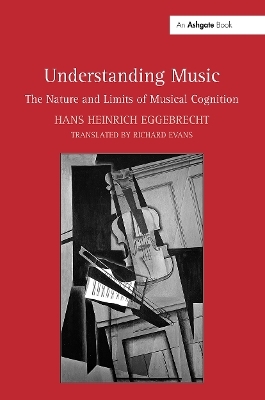
Understanding Music
Routledge (Verlag)
978-1-032-92926-2 (ISBN)
In an age when our patterns of music consumption are changing rapidly, musical understanding has never been more relevant. Understanding Music provides readers with an ideal entry point to the topic, addressing 'both the music lover who has made listening to music an important part of his life and at the same time is willing to reflect on music and his encounter with it, as well as the more academically-minded enthusiast and the thoughtful expert.' Its author, Hans Heinrich Eggebrecht, was one of the most influential German musicologists of the twentieth century and yet he is almost unknown to English readers. His published work stretches from one end of the musicological spectrum to the other, with research on historical topics in early music, Bach, Beethoven reception, Mahler and music aesthetics all featuring. Understanding Music summarizes Eggebrecht's thoughts on the relationship between music and cognition. As he says in his preface, the purpose of his book is 'to direct the reader towards the fundamental issues and processes implied in understanding music. What does understanding mean when applied to music? How is the process to be described? What different kinds of understanding are to be distinguished here? What other concepts are implicit in and related to the concept of understanding? How is the relationship between music and the listener who understands it to be articulated? What might correct understanding of music mean given music's multiplicity of meaning and effect? Where are the limits of understanding and what lies beyond? What role do language and history play?'. Eggebrecht's answers to these and other questions amount to a compelling account of how the mind grasps the sounds of music in themselves and what other factors contribute to music's meaning so much to us as listeners.
Hans Heinrich Eggebrecht (1919-1999) was one of the leading musicologists of his generation. His contribution to the field in Germany ranks alongside that of his famous contemporary Carl Dahlhaus. From 1961 until his retirement in 1988 he was Professor of Musicology at the University of Freiburg. He published work on a wide range of subjects, including medieval music, Bach, the reception of Beethoven's work and Mahler's symphonies, as well as contributing to thought on theory and aesthetics. Very little of his writing has so far been translated into English. Richard Evans studied music at Exeter University, graduating in 1979. He worked as a teacher in Germany for some years before studying the piano in Frankfurt/Main and subsequently returning to England to complete a doctorate at Bristol. He has previously contributed translations to the journal 'Music Analysis'.
Contents: Preface; Introductory sketch; Aesthetic understanding I; Intermezzo I: ontology, interpretation and performance; Aesthetic understanding II; Intermezzo II: aesthetic identification; Cognitive understanding; The limits of cognitive understanding; The encircling approach; Intermezzo III: identifying life with art - John Cage; Understanding?; Glossary; Bibliography; Index.
| Erscheinungsdatum | 16.10.2024 |
|---|---|
| Verlagsort | London |
| Sprache | englisch |
| Maße | 156 x 234 mm |
| Gewicht | 453 g |
| Themenwelt | Kunst / Musik / Theater ► Musik ► Musiktheorie / Musiklehre |
| ISBN-10 | 1-032-92926-X / 103292926X |
| ISBN-13 | 978-1-032-92926-2 / 9781032929262 |
| Zustand | Neuware |
| Informationen gemäß Produktsicherheitsverordnung (GPSR) | |
| Haben Sie eine Frage zum Produkt? |
aus dem Bereich


